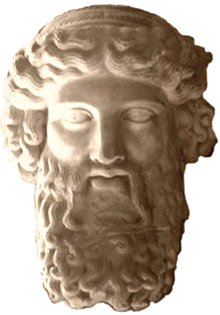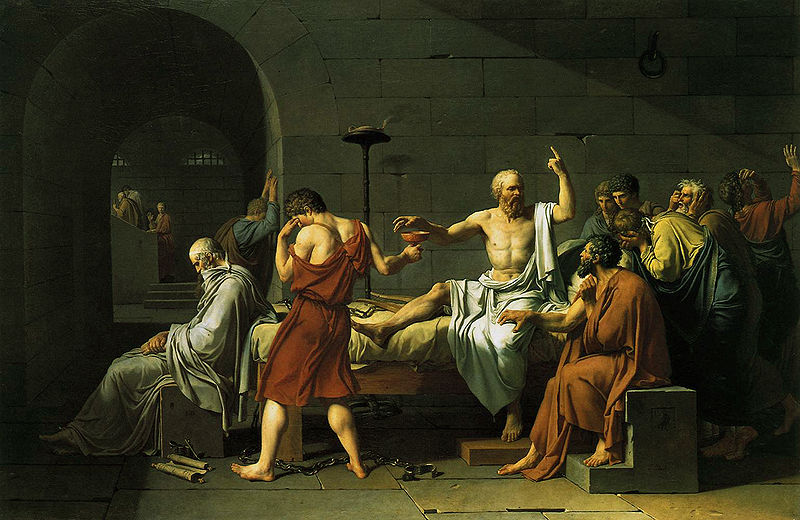|
SKEPTICISM
Skepticism was caused
by:
1. The increase
awareness of other cultures and their ideas
2. The decline in
tradition, religion, and objective values.
3. Disagreements
among philosophers
4. Democracy
THE SOPHISTS
Skepticism in Action

PROTAGORAS (About
490-420 BCE)
Protagoras by Plato
1. We perceive
the world indirectly.
2.
Perception, knowledge, truth, and values are
subjective and relative.
Objective knowledge is unattainable. (Skepticism)
There are no objective values.
Values are a matter of convention - not nature.
3. "Man is the
measure of all things ... ." (relativism)
(How should we interpret man?)
4. The goal of life is success.
True ideas are those that lead to success.
5. The Sophists taught rhetoric.
The goal of life and arguing is victory - not
virtue or truth.
..........................................
LIFE:
He was the first of
the Sophists.
Although he was an
agnostic, he said, "concerning the gods I am unable
to discover whether they exist, ... " he thought
that religion served an important purpose.
GORGIAS (483-375
BCE)
108 years old!
Gorgias by Plato

1.
True knowledge is unattainable.
His skepticism was caused by the
paradoxes of Zeno.
Reason, language, and perception are
inadequate for knowledge.
2.
We are trapped in a subjective world of our
experiences.
ANTIPHON
1. We should reject
traditions and laws, and satisfy our nature.
Our nature is to seek our own advantage - and
self-preservation.
|
S O C R A T E S
know thyself
(From the temple of Apollo at Delphi)

(469–399
BCE)

 |
Miles Burnyeat on Plato: Section 1
LIFE:
1.
His mother was a midwife.
He was referred as a midwife of ideas.
2.
He and his father were sculptors.
3.
He had a wife and three kids.
4.
His teacher was the Sophist Prodicus.
5.
Socrates taught Plato.
Plato's early dialogues represent the real Socrates.
6.
The Oracle of Delphi declared Socrates the wisest
 Man. Man.
Chaerephon posed the question.
4.
He was tried for corrupting the youth, and not
believing in the Gods.
At 70 years old he was executed by drinking hemlock.
The Sophists lost their reputation because of
Socrates.
APOLOGY BY PLATO
PHILOSOPHY:
1.
Know thyself.
Your soul is your true self.
An excellent soul is wise, virtuous, and temperate.
2.
I know only that I know nothing. (Academic
Skepticism)
3.
Virtue is knowledge.
People pursue their own good.
Being virtuous is our own good.
To know the good is to do the good.
4.
All things have an essence.
Essences can be expressed in essential definitions.
What is X? What is justice is asked in
Republic by Plato,
virtue is explored in Plato's Meno, temperance is in
the Charmides,
love is in the Symposium, friendship the Lysis,
the Laches explores courage, and the Euthyphro
duscusses piety.
5.
Contract theory of state:
In Plato's dialog the Crito
Socrates refuses to escape from jail. The
fact that he willingly remained in Athens,
means that he accepted their laws. He cannot
violate them when they are used against him.
Plato's dialogue the
Apology is the trail and conviction of
Socrates. In that dialogue, Socrates says
that he would refuse to stop doing
philosophy:
| |
And therefore if you let me go now,
and are not convinced by Anytus, ...
and that if I escape now, your sons
will all be utterly ruined by
listening to my words—if you say to
me, Socrates, this time we will not
mind Anytus, and you shall be let
off, but upon one condition, that
you are not to enquire and speculate
in this way any more, and that if
you are caught doing so again you
shall die;—if this was the condition
on which you let me go, I should
reply: Men of Athens, I honor and
love you; but I shall obey God
rather than you, and while I have
life and strength I shall never
cease from the practice and teaching
of philosophy, exhorting any one
whom I meet and saying to him after
my manner: You, my friend,—a citizen
of the great and mighty and wise
city of Athens,—are you not ashamed
of heaping up the greatest amount of
money and honor and reputation, and
caring so little about wisdom and
truth and the greatest improvement
of the soul, which you never regard
or heed at all? And if the person
with whom I am arguing, says: Yes,
but I do care; then I do not leave
him or let him go at once; but I
proceed to interrogate and examine
and cross-examine him, and if I
think that he has no virtue in him,
but only says that he has, I
reproach him with undervaluing the
greater, and overvaluing the less.
And I shall repeat the same words to
every one whom I meet, young and
old, citizen and alien, but
especially to the citizens, inasmuch
as they are my brethren. For know
that this is the command of God; and
I believe that no greater good has
ever happened in the state than my
service to the God. For I do nothing
but go about persuading you all, old
and young alike, not to take thought
for your persons or your properties,
but first and chiefly to care about
the greatest improvement of the
soul. I tell you that virtue is not
given by money, but that from virtue
comes money and every other good of
man, public as well as private. This
is my teaching, and if this is the
doctrine which corrupts the youth, I
am a mischievous person. But if any
one says that this is not my
teaching, he is speaking an untruth.
Wherefore, O men of Athens, I say to
you, do as Anytus bids or not as
Anytus bids, and either acquit me or
not; but whichever you do,
understand that I shall never alter
my ways, not even if I have to die
many times. |
|
The Great Dialogues of Plato
THRASYMACHUS
Republic by Plato
1.
Justice is the interest of the strong - the golden
rule:
He who has the most gold makes all
the rules.
2.
To be just is to obey the laws of those in power.
3.
The powerful make mistakes.
4.
The powerful can make laws that are not in their
interest.
5.
To obey these laws is not in the interest of the
strong; therefore
6.
to be just is to do what is, and is not, in the
interest of the strong.
THE ARGUMENT AGAINST THRASYMACHUS &
THE SOPHISTS
1.
Power-brokers may make laws that aren't in their
interest.
2. Obeying such
laws isn't in their interest; therefore
3. being just
is to do what is in the interest of the strong - and
not to do what is in the interest of the strong.
4. The Sophists
contradict themselves; they say there are no
objective truths. Truth is relative, and all
opinions are equal. At the same time they say that
their position is better and true.
|
